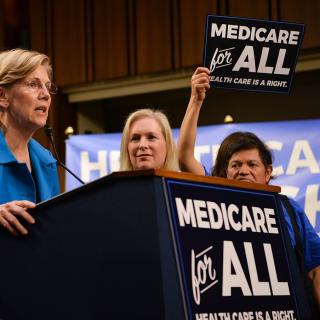The recent legislation passed by the United States Congress, oddly named One Big Beautiful Bill (OBBB), and signed by the U.S. president, shows that Republican lawmakers in the nation’s capital don’t care about excess and premature mortality in the United States.
If these increased deaths truly mattered to the Republican representatives and senators, the OBBB would not have included such a lack of concern for its dreadful consequences on human life and wellbeing.
In the coming months, the OBBB can be expected to result in excess and premature deaths in the United States, especially among vulnerable groups, such as low-income individuals and families, children, people with disabilities, and seniors.
The lack of concern from Republican lawmakers about the expected excess and premature mortality resulting from the OBBB is evident in the candid remark made by an Iowa Republican senator during a recent town hall meeting.
When a constituent expressed concerns about potential deaths resulting from cuts to Medicaid in the proposed budget bill, the Republican senator responded by saying, “"People are not … well, we're all going to die, so for heaven's sakes."
Her comment that “we’re all going to die” reflects the lack of concern and empathy among U.S. Republican officials regarding the impact of the OBBB’s life-threatening cuts to Medicaid and food assistance (SNAP), as well as changes to the Affordable Care Act (ACA), and other vital government services.
In fact, the budget cut in Medicaid, approximately a $1 trillion reduction over the next 10 years, far exceeds any other cut the United States has made in its social safety net.
These various cuts and changes are expected to lead to increased uninsured rates, reduced access to healthcare services, and increased mortality across the country. The millions of U.S. citizens without health insurance coverage and access to care will lead to people skipping preventative care, treatments and prescriptions, which together will contribute to increased illness and preventable deaths.
It is estimated that the OBBB could result in over 51,000 U.S. deaths annually due to disenrollments from Medicaid and the Health Insurance Marketplace coverage, as well as reductions in nursing home care and loss of drug subsidies for low-income seniors.
Additionally, imposing work requirements on individuals in need of health insurance through the OBBB does not increase employment levels, but inhibits access to necessary health care.
The OBBB could also lead to an increase in greenhouse gas emissions, potentially causing more life-threatening weather events and contributing to an estimated 900 annual premature U.S. deaths from local air pollution by 2035.
Besides the OBBB, budget cuts have also been implemented in agencies and departments related to justice, health, education, housing, environment, basic scientific research, and weather forecasting.
The U.S. administration also laid off meteorologists, froze critical positions at the Federal Emergency Management Agency, reduced coordination grants at the National Oceanic and Atmospheric Administration, and cut funding for agencies essential for making emergency warnings and responses possible and reducing deaths.
With the anticipated increase in deaths resulting from the OBBB, the mortality ranking of the United States among developed countries will probably deteriorate. Even before the adoption of this problematic budget legislation, the U.S. position on mortality levels among wealthy developed countries was mediocre at best.
For instance, consider deaths that occur during the first year of life. America’s infant mortality rate is significantly higher than the average of other developed nations.
In recent years, the United States has ranked 33rd out of 38 OECD countries on this crucial mortality measure. In 2023, the US infant mortality rate was 6 infant deaths per 1,000 births, compared to an infant mortality rate of 2 for Italy, Japan, and Sweden.
Additionally, the US has the highest maternal mortality rate among wealthy nations. American mothers are dying from pregnancy-related causes at much higher rates than mothers in any other affluent country. In 2022, the US maternal mortality rate was 22.3 deaths per 100,000 live births, far above rates for other high-income countries, such 3.4 for Japan, 7.6 for France and 8.4 for Canada.
Regarding longevity, life expectancy at birth in the United States in 2023 was 78 years. However, life expectancy varied significantly based on income levels, with the gap widening over time. In 2023, the richest Americans in the top 1% of US counties lived 84 years, while those in the bottom 50% of counties averaged 77 years.
Many countries are significantly ahead of the US in terms of life expectancy. For instance, Japan has a life expectancy of 87 years, Italy 84 years, and Sweden 83 years.
It is crucial to acknowledge that the expected increase in excess and premature mortality in the United States is not due to a foreign government or overseas enemy. Instead, it is self-inflicted by the policies, actions and choices of a Republican-led government.
How will Republicans respond to the anticipated rise in premature deaths? History suggests they will probably react with their three D's: Denial, Dismissal, and Distraction.
In conclusion, considering the expected increase in excess and premature deaths due to the OBBB and related policies of the US administration, as well as the likely response from Republican lawmakers, including the president, it appears that they simply do not care about mortality in the United States. (Fertility, on the other hand, is a completely different matter.)
-------------------------------
Joseph Chamie is a consulting demographer, a former director of the United Nations Population Division, and author of many publications on population issues, including his recent book, "Population Levels, Trends, and Differentials".



